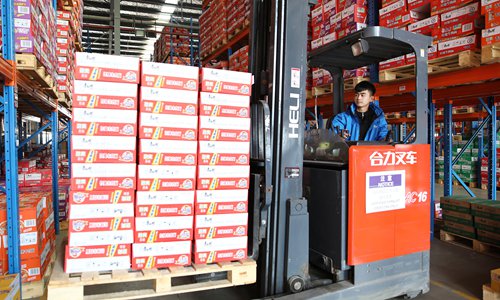HOME >> BUSINESS
Indian products tough to find ahead of Singles’ Day
By Wang Bozun Source:Global Times Published: 2019/11/5 20:48:42

Employees prepare for the upcoming Double 11 shopping festival at an e-commerce warehouse in Liangyungang, East China's Jiangsu Province on Thursday. Photo: VCG
As Double 11, the largest online shopping carnival in the world, is set to take place on November 11, both domestic and foreign vendors are eager to advertise on Chinese e-commerce platforms including Tmall and JD, but brands from India, a fast-growing emerging economy, are barely seen.
According to reports, Alibaba scored $30.8 billion of transactions during last year's Double 11, bigger than the total spending of other major sales events in the world including Black Friday ($6.2 billion), Cyber Monday ($7.9 billion) and Amazon Prime Day ($4.2 billion).
Sales of foreign brands accounted for 27 percent of Alibaba's transactions during last year's Double 11, with brands from Japan, the US and South Korea scoring the top three among overseas countries, according to AlixPartners, a global consulting firm.
Experts forecast the ratio will increase to 30 percent this year.
A Global Times reporter noticed that brands from major economies such as Japan, Germany and France have been racing to catch customers by way of promotions on different e-commerce platforms, but brands from India, which ranked No.7 on the world GDP list in 2018, are hardly seen.
April, a woman who runs a store carrying Indian goods on Alibaba's Taobao platform, told the Global Times that her sales volume is not high due to low demand. "I don't have any plan to carry out promotions for the Double 11, because Chinese customers don't know or care much about Indian goods," she said.
In recent years, apart from some spices and health products, Indian goods have rarely been seen in the Chinese market. Tian Yun, vice director of the Beijing Economic Operation Association, told the Global Times that in the past, instead of heavy industrial products, goods that China imported from India were mainly labor-intensive products, resource products or agricultural products.
China and 14 other partners in the Asia-Pacific region on Monday concluded years of negotiations for the Regional Comprehensive Economic Partnership (RCEP), which is expected to be signed next year. However, India did not make a final decision on joining the pact, as it still has "significant outstanding issues," the joint statement said.
Tian stressed that, in the long run, "if India wants to make its products more competitive to access other markets such as China, it has to upgrade its industrial structure, which requires a more open economy." "Countries including Cambodia, the Laos and Myanmar have seized the opportunity. If India doesn't follow up, maybe in 10 years those countries could be more competitive than India," Tian said.
"With the slowdown in growth in a lot of big economies including China and India and a strong trend against globalization, both our countries need to work together to increase trade and investment to create engines of growth, which is a desire of 2.7 billion people living in these countries," Atul Dalakoti, executive director for China at the Federation of Indian Chambers of Commerce and Industry, said.